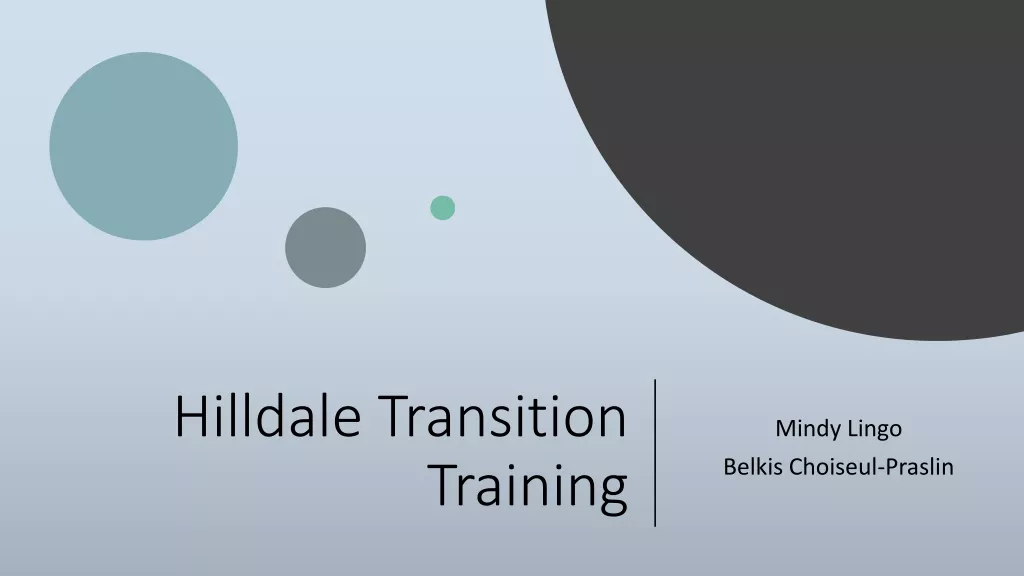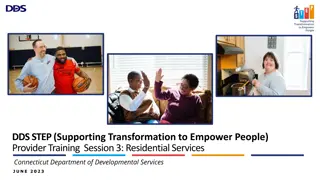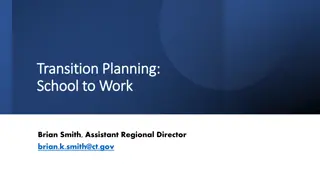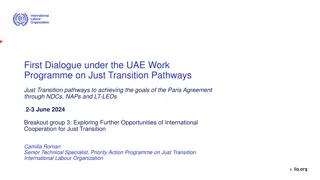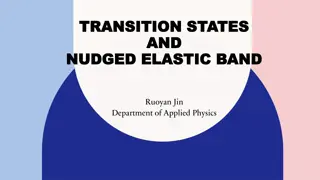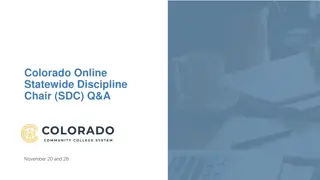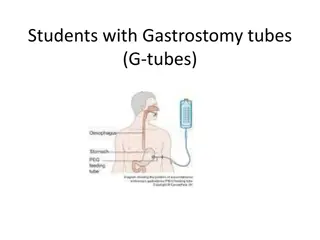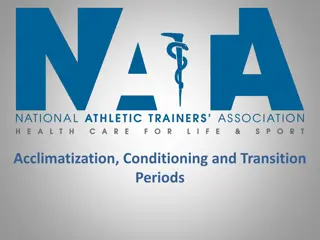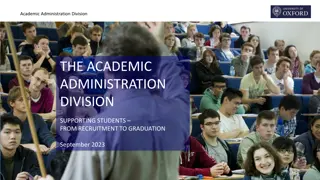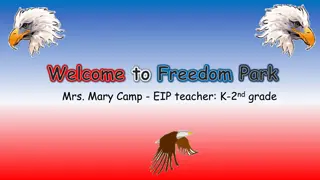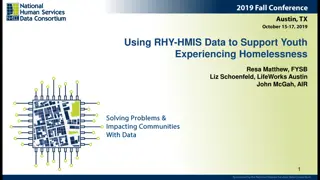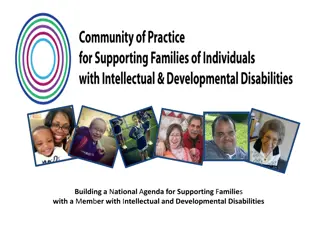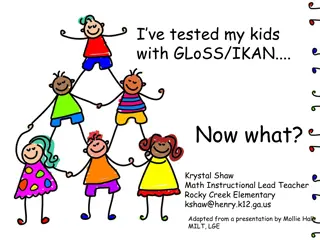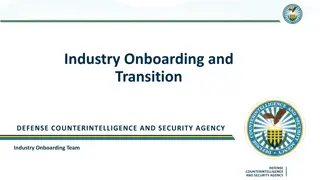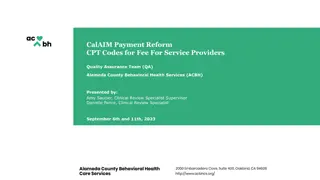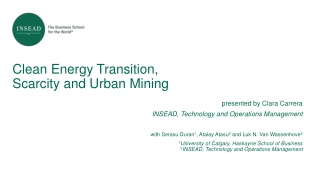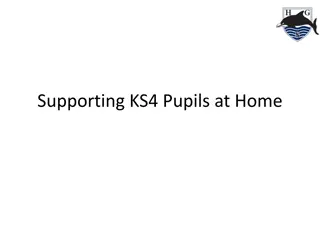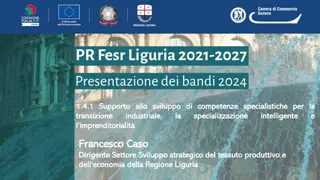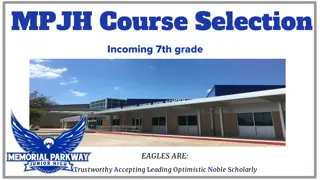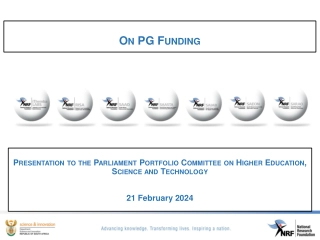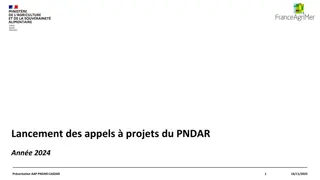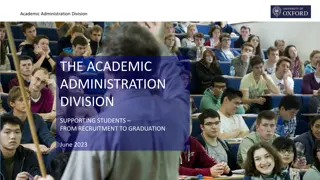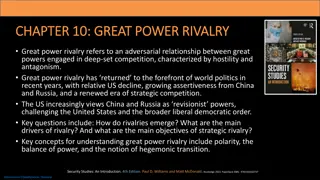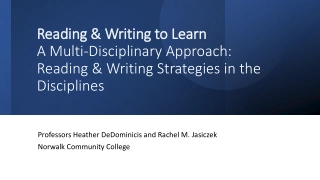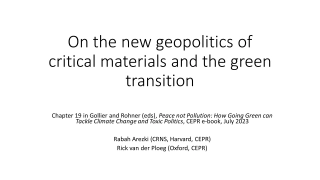Supporting Students through the Transition: Key Challenges and Strategies
Explore the transition from GCSE to A-Level through a geographical lens at the Geographical Association Conference 2021. Andy Barker and Dr. Richard Waller discuss key challenges like study skills, geographical thinking, and learning culture. Discover strategies such as promoting wider reading, news stories mapping, online scrapbooks, and showcasing outstanding organization. Attendees reflect on current transition processes and identify ways to support students effectively.
- Transition support
- Geographical Association Conference
- Study skills
- Wider reading
- Learning strategies
Download Presentation
Please find below an Image/Link to download the presentation.
The content on the website is provided AS IS for your information and personal use only. It may not be sold, licensed, or shared on other websites without obtaining consent from the author. Download presentation by click this link. If you encounter any issues during the download, it is possible that the publisher has removed the file from their server.
Presentation Transcript
Supporting students through the transition from GCSE to A level ANDY BARKER STOKE-ON-TRENT SIXTH FORM COLLEGE DR RICHARD WALLER KEELE UNIVERSITY GEOGRAPHICAL ASSOCIATION CONFERENCE 2021
Introductions 1. Andy Barker Curriculum Manager for Earth Sciences at The City of Stoke-on-Trent Sixth Form College 2. Dr Richard Waller Senior Lecturer in Geography and Geography Admissions Tutor at Keele University GEOGRAPHICAL ASSOCIATION CONFERENCE 2021
Context Sixth Form College 80 students across Years 12 & 13 Eduqas (A-Level) Established links with Keele University GEOGRAPHICAL ASSOCIATION CONFERENCE 2021
Aims To explore some of the key challenges of transition from GCSE to A-Level from a Geographical perspective To reflect on your current transition processes in light of the current context To identify a range of strategies to support the transition process GEOGRAPHICAL ASSOCIATION CONFERENCE 2021
Three Key Challenges Developing Study Skills Geographical Thinking Affiliation and Learning Culture GEOGRAPHICAL ASSOCIATION CONFERENCE 2021
Strategies 1. Promoting wider reading Use of Flipboard & wider reading lists and logs Developing Developing Study Skills Study Skills 2. News Stories Mapping Activity 3. Online scrapbook Padlet or Jamboard 4. Showcasing outstanding organisation Information Literacy 5. What does independent learning look like? Wider Reading Language Development Organisation Time-management Note-taking Essay writing GEOGRAPHICAL ASSOCIATION CONFERENCE 2021
1. Promoting wider reading Use of Flipboard & wider reading lists and logs GEOGRAPHICAL ASSOCIATION CONFERENCE 2021
A-level Geography Review Geofactsheets Geofile Geographical Books (maybe one chapter) GEOGRAPHICAL ASSOCIATION CONFERENCE 2021
1. Read Chapter 1 (Haiti) 2. Complete the wider reading log 3. Watch the interview GEOGRAPHICAL ASSOCIATION CONFERENCE 2021
2. News Stories Mapping Activity GEOGRAPHICAL ASSOCIATION CONFERENCE 2021
3. Online scrapbook Padlet or Jamboard University of Sussex Blog GEOGRAPHICAL ASSOCIATION CONFERENCE 2021
4. Showcasing outstanding organisation GEOGRAPHICAL ASSOCIATION CONFERENCE 2021
WHAT DOES INDEPENDENT STUDY LOOK LIKE IN GEOGRAPHY, GEOLOGY & ENVIRONMENTAL SCIENCE? OTHER Tips After the Learning Phase spend 60 mins .. Compare to the spec / revision outline to see if you have any gaps in your notes. At the End of the Unit spend 90 mins . After the Lesson spend 30 mins REVIEW YOUR NOTES REVIEW YOUR NOTES REVIEW YOUR NOTES Highlight key terms. Identify the main points of the lesson. Identify any evaluation points Compare to the spec to see if you have any gaps in your notes. Complete an hour of Seneca each week focusing on the topics you struggle with most. FILL IN ANY GAPS YOU HAVE. Use textbooks / PPTs to fill in any gaps that you have in your notes. FILL IN ANY GAPS YOU HAVE. Use textbooks / PPTs to fill in any gaps that you have in your notes. CHECK YOUR UNDERSTANDING Identify the terms you can t define. Identify concepts you don t know. READ SOME ARTICLES FROM FLIPBOARD Make sure that you complete a reading log for each article. CHECK YOUR TEXTBOOK APPLY TO AN EXAM QUESTION Plan out the exam question. Put in as much detail as you can. Complete the exam question Keep going back to topics, redo activities and see what you can remember Use textbooks or revision guide to look at what you don t get to see if that clarifies it. CHECK YOUR UNDERSTANDING Test your self Complete activities from the revision guide and student guides ORGANISE YOUR FILE ADD TO YOUR REVISION OUTLINE Ensure your file is up to date and in chronological order ASK FOR HELP See your teacher for help with anything you are not sure on or don t understand. Add examples / case studies covered to your revision outline. Make links and cross reference between topics. ASK FOR HELP POST IT NOTE REMINDERS SUMMARISE THE PHASE Summarise the topic on to a trigger sheet. E.g. Flash Card, Cornell sheet, Mind map Make a note of the parts you are not sure on to remind you to ask your teacher in the next lesson. See your teacher for help with anything you are not sure on or don t understand. Be aware of what is happening in the world Adapted from @HecticTeacher on Twitter
Strategies 1. Developing AO2 using past questions Geographical Geographical Thinking Thinking 2. Developing geographical thinking using infographics 3. Enable students to complete a MOOC or similar 4. Use Time for Geography Ask 5. FSC & Encounter Edu Analyse Explore GEOGRAPHICAL ASSOCIATION CONFERENCE 2021
1. Developing AO2 using past questions Which hazards are primary or secondary? What is an earthquake? What are the hazards associated with earthquakes? Earthquakes only generate hazards at the local scale. Discuss. Could a local hazard eventually become a regional / global hazard? Does magnitude affect the scale of the hazard? Which hazards are regional / global? Which hazards are concentrated locally? Any examples? Do you agree or disagree with the statement? GEOGRAPHICAL ASSOCIATION CONFERENCE 2021
Simon Oakes Eduqas GEOGRAPHICAL ASSOCIATION CONFERENCE 2021
2. Developing geographical thinking using infographics Infographics available here courtesy of @missgeog92 GEOGRAPHICAL ASSOCIATION CONFERENCE 2021
3. Enable students to complete a MOOC or similar GEOGRAPHICAL ASSOCIATION CONFERENCE 2021
4. Use Time for Geography GEOGRAPHICAL ASSOCIATION CONFERENCE 2021
5. FSC & Encounter Edu GEOGRAPHICAL ASSOCIATION CONFERENCE 2021
Strategies Affiliation & Affiliation & Learning Learning Culture Culture 1. Introduce students to the course 2. Record a lesson / screencast for applicants 3. Record something in a fieldwork location 4. Share the handbook 5. Perceptions of current students Connections Conventions Values Practices Processes GEOGRAPHICAL ASSOCIATION CONFERENCE 2021
1. Introduce students to the course GEOGRAPHICAL ASSOCIATION CONFERENCE 2021
2. Record a lesson / screencast for applicants GEOGRAPHICAL ASSOCIATION CONFERENCE 2021
3. Record something in a fieldwork location GEOGRAPHICAL ASSOCIATION CONFERENCE 2021
4. Share the handbook GEOGRAPHICAL ASSOCIATION CONFERENCE 2021
5. Perceptions of current students GEOGRAPHICAL ASSOCIATION CONFERENCE 2021
When to tackle the key challenges? When? Pre- Longer Term Induction enrolment GEOGRAPHICAL ASSOCIATION CONFERENCE 2021
Thank You Any other final comments / thoughts? Please feel free to get in touch with questions andrew.barker@stokesfc.ac.uk GEOGRAPHICAL ASSOCIATION CONFERENCE 2021


